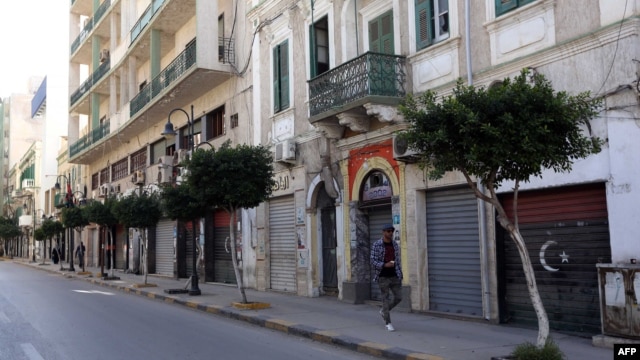
A picture taken Nov. 17, 2013, shows a man walking past closed shops in the Libyan capital Tripoli.
Most businesses and schools in Libya's capital are closed Sunday after residents called for a strike to protest recent deadly violence by militias in Tripoli.
Streets in the capital are deserted and residents have set up roadblocks to protect their neighborhoods from more possible violence.
The head of Tripoli's city council, al-Sadat al-Badri, says the strike is to last three days.
Violence broke out Friday when at least 43 people were killed and more than 450 wounded when militiamen from the city of Misrata opened fire on protesters who had marched, demanding the group leave the capital city.
At least one more person was killed and several others wounded Saturday when fresh clashes erupted in Libya's capital as soldiers and militias supporting the government tried to restore peace.
Libyan Prime Minister Ali Zidan warned militiamen not to enter Tripoli in an appeal for restraint. Police have limited travel to the city's Gharghour neighborhood, where a militia originally from outside Tripoli is based.
The militias are holdovers from the 2011 uprising that ousted dictator Moammar Gadhafi and are a powerful force in the North African country.
The U.S. Department of State condemned the violence and urged restraint, saying there was "no place for this kind of violence in the new Libya."
Protesters had marched to Tripoli's Gharghour neighborhood Friday chanting, "we want an army, we want police," as they demanded that the country's security forces take the place of militias.
At first, the gunmen fired into the air to scare them off, but as the march continued, they fired at the protesters.
Demonstrators fled, but later returned with their own weapons to attack the compound where the militiamen remained holed up. |
|
